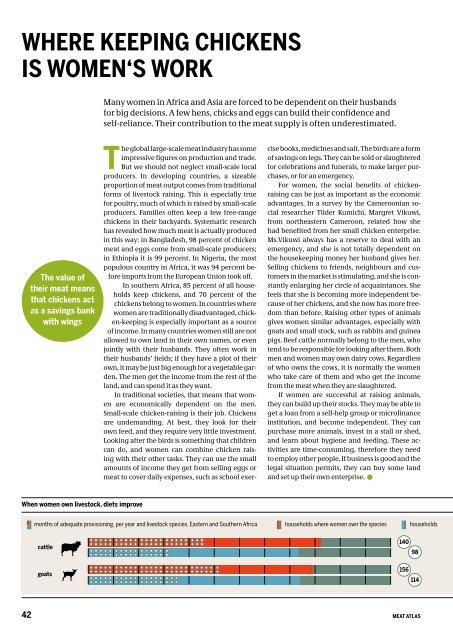1jjtwKx
1jjtwKx
1jjtwKx
You also want an ePaper? Increase the reach of your titles
YUMPU automatically turns print PDFs into web optimized ePapers that Google loves.
WHERE KEEPING CHICKENSIS WOMEN‘S WORKMany women in Africa and Asia are forced to be dependent on their husbandsfor big decisions. A few hens, chicks and eggs can build their confidence andself-reliance. Their contribution to the meat supply is often underestimated.The value oftheir meat meansthat chickens actas a savings bankwith wingsThe global large-scale meat industry has someimpressive figures on production and trade.But we should not neglect small-scale localproducers. In developing countries, a sizeableproportion of meat output comes from traditionalforms of livestock raising. This is especially truefor poultry, much of which is raised by small-scaleproducers. Families often keep a few free-rangechickens in their backyards. Systematic researchhas revealed how much meat is actually producedin this way: in Bangladesh, 98 percent of chickenmeat and eggs come from small-scale producers;in Ethiopia it is 99 percent. In Nigeria, the mostpopulous country in Africa, it was 94 percent beforeimports from the European Union took off.In southern Africa, 85 percent of all householdskeep chickens, and 70 percent of thechickens belong to women. In countries wherewomen are traditionally disadvantaged, chicken-keepingis especially important as a sourceof income. In many countries women still are notallowed to own land in their own names, or evenjointly with their husbands. They often work intheir husbands’ fields; if they have a plot of theirown, it may be just big enough for a vegetable garden.The men get the income from the rest of theland, and can spend it as they want.In traditional societies, that means that womenare economically dependent on the men.Small-scale chicken-raising is their job. Chickensare undemanding. At best, they look for theirown feed, and they require very little investment.Looking after the birds is something that childrencan do, and women can combine chicken raisingwith their other tasks. They can use the smallamounts of income they get from selling eggs ormeat to cover daily expenses, such as school exercisebooks, medicines and salt. The birds are a formof savings on legs. They can be sold or slaughteredfor celebrations and funerals, to make larger purchases,or for an emergency.For women, the social benefits of chickenraisingcan be just as important as the economicadvantages. In a survey by the Cameroonian socialresearcher Tilder Kumichi, Margret Vikuwi,from northeastern Cameroon, related how shehad benefited from her small chicken enterprise.Ms.Vikuwi always has a reserve to deal with anemergency, and she is not totally dependent onthe housekeeping money her husband gives her.Selling chickens to friends, neighbours and customersin the market is stimulating, and she is constantlyenlarging her circle of acquaintances. Shefeels that she is becoming more independent becauseof her chickens, and she now has more freedomthan before. Raising other types of animalsgives women similar advantages, especially withgoats and small stock, such as rabbits and guineapigs. Beef cattle normally belong to the men, whotend to be responsible for looking after them. Bothmen and women may own dairy cows. Regardlessof who owns the cows, it is normally the womenwho take care of them and who get the incomefrom the meat when they are slaughtered.If women are successful at raising animals,they can build up their stocks. They may be able toget a loan from a self-help group or microfinanceinstitution, and become independent. They canpurchase more animals, invest in a stall or shed,and learn about hygiene and feeding. These activitiesare time-consuming, therefore they needto employ other people. If business is good and thelegal situation permits, they can buy some landand set up their own enterprise.When women own livestock, diets improvemonths of adequate provisioning, per year and livestock species, Eastern and Southern Africa households where women own the species householdscattlegoats1409815611442MEAT ATLAS


